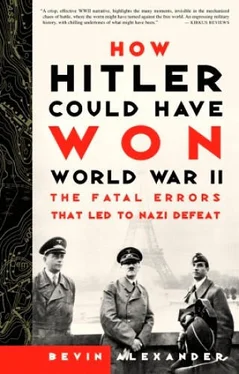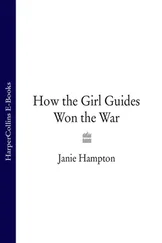The tank losses in this one mad attack largely offset the gains of Rommel’s superb maneuvers over the past several days.
Rommel’s offensive power had been crippled. But he was not ready to back off, and he conceived a brilliant riposte: to strike deep into the British rear, with the aim of cutting enemy supply lines, and restoring the situation on the Sollum–Halfaya Pass front. Rommel hoped Cunningham would be so unnerved by this unexpected move he would give up the fight.
In light of Axis weakness and British strength, this was the boldest decision Rommel ever made. A more conventional commander would have finished off the remnants of 30th Corps scattered all over the battlefield, or crushed 2nd New Zealand Division, still advancing westward toward Tobruk. But Rommel knew direct assaults on either of these forces would consume what little strength he had remaining. Besides, British cruiser tanks were faster than his own, and could avoid destruction by escaping.
Rommel saw that the only hope for victory was a vigorous strike into the heart of enemy resistance. This might shake enemy morale, and it especially might play on the fears of the British commanders.
Rommel scraped together a weak force from various formations to keep up the Tobruk siege. Then, at midday on November 24, he struck eastward with 21st Panzer, ordering 15th Panzer, Ariete, and Trieste divisions to follow.
The unexpected advance scattered the 7th Armored and 1st South African divisions in front of him, and, in five hours, he reached the frontier sixty miles away at Bir Sheferzen, twenty miles south of Halfaya Pass. Rommel at once sent a battle group through a gap in the frontier wire and belt of mines to Halfaya to dominate 8th Army’s route of retreat and supply along the coast road.
The move threw 30th Corps into chaos, and caused Cunningham to do precisely what Rommel hoped he’d do: call for immediate withdrawal of 8th Army back into Egypt. But General Auchinleck arrived at 30th Corps headquarters and ordered continuation of the campaign. It was a brave decision. Auchinleck’s commanders had panicked at Rommel’s surprise move, and could think only of flight. But Auchinleck knew that Rommel’s strength was practically exhausted, while 8th Army still had great untapped resources, including many tanks in rear depots. He had the moral courage to stand when many another commander would have run. The decision ensured Rommel’s defeat.
It was obvious to Auchinleck that Cunningham had to be replaced, and on November 26 he named Lieutenant General Sir Neil Ritchie, his deputy chief of staff, to command 8th Army. This guaranteed that, whatever the risks, the battle would continue.
Rommel’s own vehicle got stranded on the opposite side of the frontier fence because of engine trouble. But Cruewell’s command vehicle, a covered van captured from the British, came past, and picked him up. When night fell, the German commanders could not find their way through the frontier minefields, so they and their staffs spent the night with Indian dispatch riders going back and forth and British tanks and trucks moving past. At daybreak they slipped away unchallenged, and crossed back into Libya.
On his return Rommel found that 15th Panzer had still not reached the frontier, while Ariete and Trieste Divisions had halted well to the west upon encountering a brigade of 1st South African Division. Also, supply columns bringing fuel and ammunition had failed to arrive. Rommel now could not carry out his plan to send a battle group to seize Habata, the new British railhead thirty-five miles southeast of Halfaya Pass, or to block the British supply and escape route along the escarpment running southeast into Egypt from Halfaya. His bid to force the British to retreat had failed. Even so, Rommel stubbornly held on, hoping for an opportunity to strike a killing blow.
Meanwhile, 13th Corps, led by 2nd New Zealand Division and ninety “I” tanks, pushed on westward toward Tobruk. The scratch force that was left to defend the Sidi Rezegh area was soon under great pressure. On November 25, the New Zealanders seized Belhamed, only nine miles southeast of the Tobruk perimeter. The next night, the Tobruk garrison crashed through Axis besiegers and gained the top of the escarpment at Ed Duda, only a couple of miles from the New Zealanders.
Panzer Group headquarters sent frantic radio signals asking for return of the panzers, but Rommel was not willing to give up so readily. He ordered Cruewell to drive north and clear the Sollum front by thrusts of 15th Panzer on the west and 21st Panzer, already at Halfaya, on the east. However, 15th Panzer had gone back to Bardia, fifteen miles north of Sollum, to refuel. At the same time 21st Panzer also headed toward Bardia because of a misinterpreted order.
Rommel realized his hopes were gone and ordered 21st Panzer back to defend Tobruk, but kept 15th Panzer south of Bardia. Early on November 27 the division’s tanks overran headquarters of 5th New Zealand Brigade at Sidi Azeis, ten miles southwest of Bardia, and captured the commander, 800 men, and several guns. With this success, Rommel ordered 15th Panzer to move back toward Tobruk as well.
On the frontier, Africa Corps had gained nothing decisive. Now it was down to only a fraction of its original strength, while the British, left in possession of the Sidi Rezegh battlefield, had been able to repair many tanks and receive replacements from Egypt. British tank strength was now 130 to 40 German, but Rommel continued to use his armor in concert, while the British kept theirs scattered.
Rommel hoped to keep the Tobruk garrison isolated, and to destroy the two New Zealand brigades (2nd and 4th) in the Belhamed area. On November 29, 15th Panzer detoured to the south and west around Sidi Rezegh and, in a bitter engagement, seized Ed Duda in an advance from the southwest. Ariete Division and 21st Panzer were to attack the New Zealanders from the east and south, but made little headway against British armor that drove against them on their southern flank.
The men of Panzer Group were exhausted, the weather was cold, the country without water, and the Axis supply line in tatters. Although the New Zealanders were nearly encircled, strong British armor threatened to push aside the light forces covering the Axis southern flank, and the 1st South African Division was coming forward to help.
But Rommel was still determined, and so were his men. On the morning of November 30, 15th Panzer with the help of battle groups from 90th Light attacked southward from the escarpment north of Sidi Rezegh. By evening they had gained some New Zealand positions, 600 prisoners, and twelve guns. During the same period, 21st Panzer and Ariete stopped a relieving attack by British armor from the south.
During the night most of the New Zealanders broke out, although the Germans captured more than 1,000 men and twenty-six guns. British armor and infantry moved south and east to regroup. Tobruk once more had been isolated.
Rommel appeared to have won. But the price had been too high. He had no offensive power left, while British tank strength was growing daily with shipments from the rear. If his army were to survive to fight another day, Rommel had to extricate it.
With the same boldness he had employed in the attack, Rommel pulled back his forces swiftly in a masterful series of engagements, preventing the British in every case from surrounding Axis units and forcing their surrender.
On January 6, 1942, Rommel reached Mersa el Brega, on the border of Tripolitania. Once more all of Cyrenaica had been evacuated. The Axis garrison marooned at Bardia surrendered on January 2, 1942, but a starving force at Halfaya Pass didn’t give up until January 17. This so delayed British movements, especially of supplies, that the British could maintain only the 1st Armored Division, fresh from England, and the 201st Guards Brigade at Agedabia.
Читать дальше


![Джонатан Димблби - Barbarossa - How Hitler Lost the War [calibre]](/books/385421/dzhonatan-dimblbi-barbarossa-how-hitler-lost-the-w-thumb.webp)









